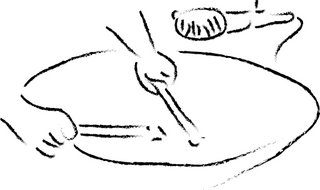"The Situation in Trinidad"

Imagine going to the library and stumbling across a large, hardbound folio volume of extremely detailed, naturalistic color photos of, say, Abraham Lincoln going about his daily life. All the weird little moments: petting a dog, blowing on a cup of coffee, getting a haircut. I'm not talking about dreamy Matthew Brady tableaus, either, but vivid documentary snapshots, unposed and perhaps a little awkward. The feeling as you turned the pages, I think, would be one of astonishment and -- for some, at least -- a deep relief that these little things that you assumed were lost had been incomprehensibly, miraculously spared.
This is the feeling I have when I listen to Emory Cook's field recordings of Trinidad calypso from '50s. Cook was a person similar to Alan Lomax, but more catholic in his preservational instincts. Whereas Lomax dragged his equipment from porch to porch capturing field hollers and children's song-games, Cook turned his microphones on everything from thunderstorms and locomotives to... calypso.
Most people, I think, would hate it. This isn't studio-recorded Harry Belafonte calypso, smoothed-out by a trained chorus and reverb effects. It is, instead, a documentary of what it was like to be in a calypso tent at carnival-time in the mid-'50s. The effect is eerie: because of Cook's technical prowess and superb equipment (he was a revolutionary engineer of sound equipment) these recordings sound clearer and more detailed than comparable studio recordings of the era. In holographically crisp stereo you find yourself transported to a moment in real life: the audience around you clapping and laughing, the goofy sax solos, the scuff of feet dancing, the clanging approach and departure of a marching steel band, the distant booming of Mighty Sparrow crooning through an outdoor sound-system- you are, by proxy, in Trinidad.
This has the unusual effect of making you nostalgic for a time and place you never knew, particularly with regard to the social engagement of the music. These songs are like nothing today (certainly in America) in their appeal to the intelligence, humor, and political consciousness of the audience. In "The Situation in Trinidad" (also known as "No, Doctor, No") Mighty Sparrow does the unthinkable- he creates a highly melodic, charming criticism of- his government's approach to tax policy, milk shortage, and local industry. And this song was popular! The equally infectious "Jean and Dinah" (a. k. a. "Yankees Gone") talks about the explosion of cheap prostitution following the closing of the US naval base. These are songs that would actually make politicians nervous. Also interesting is Lord Melody's "Booboo Man", in which the ugly singer (and Lord Melody did, by all accounts, have 'a face like a crocodile') grows angry at the jokes of his children. This is unpatronizing music for adults with children, pop music that assumes you're out of high school.
It's galling to compare popular song in America today. Our art is completely disengaged from politics, instead aiming to create artificial atmosphere of 'cool' that is meant to appeal, presumably, to people under 25. The closest thing I can think to a successful socially relevant piece of pop music in the last few years is that techno track that took a snippet of Bush's 'weapons of mass destruction' speech and reassembled it to create bromides such as 'fear is a weapon of mass destruction.' Compared to "The Situation in Trinidad", the Bush song is just a sour little joke from people who are snickering at the train running off the rails. More importantly, it's a very generalized sentiment.
At the other end of American popular music, the opposite sentiment is given equally generic treatment: when the guy in sunglasses and cowboy hat solemnly croons that "freedom isn't free", it's just a bland exhortation to do- what? The crassest WWI propaganda song about kicking the Kaiser was at least clear in its goals. In today's shifting political climate, the songs are as vague as the policy of the government. "Freedom isn't free" is a blank check.
The closest thing we have to the political engagement of calypso is angry black music, which I guess I'll discuss again in a later post.
Anyway, don't let the naive political sentiment in the last few paragraphs put you off from sampling the Cook recordings.
You can click through to find some at:
http://www.folkways.si.edu/index.html

0 Comments:
Post a Comment
<< Home